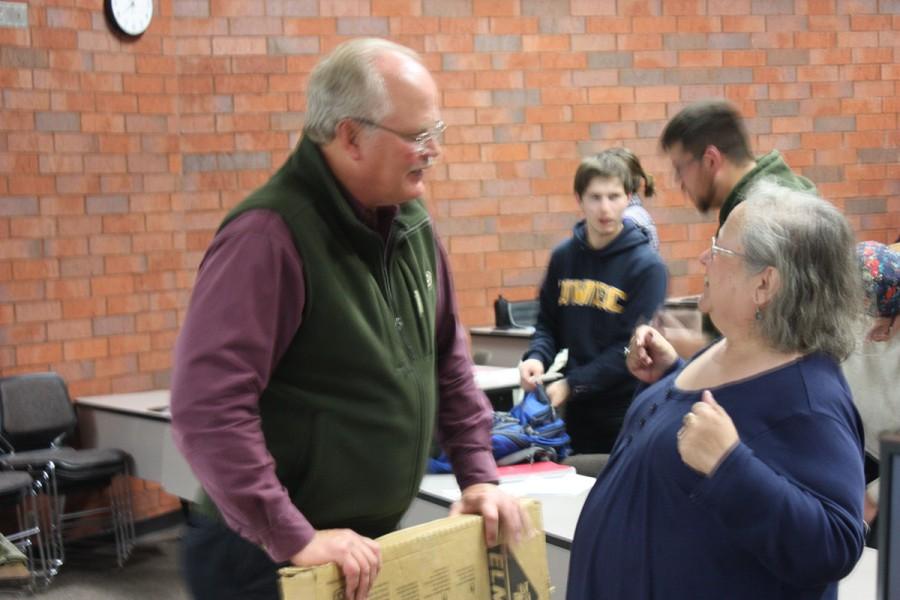Discussing the districts
Two former state senators from different parties talk about redistricting issues
More stories from Sam Martinez
Photo by Sam Martinez
Former State SenatorDale Schultz, R-Richland Center, stays late after his presentation to speak with Margaret Cameron of Eau Claire about education.
As a former State Senator, Tim Cullen, D-Wis., spends a lot of time talking with Wisconsin voters. He said voters often ask why Wisconsin legislators act against popular opinion.
“I say (state legislators) don’t care what you think,” Cullen said. “They don’t have to care what you think because of their district.”
Cullen and former State Senator Dale Schultz, R-Wis., came to the UW-Eau Claire campus to speak about the gerrymandering that tends to happen when redistricting is left in the hands of legislators.
Every ten years a new census gives each state the chance to redraw the electoral districts of its legislators. Redistricting is a way to ensure each elected official is representing the same number of people.
Some states, such as Iowa, leave the redistricting process to a nonpartisan group. However, many states, like Wisconsin, grant state legislators the power to draw new district lines.
“(The speakers) said voters should choose politicians, not the other way around,” Rory Smuhl, a junior geography major, said. “(Wisconsin) is a good example of once people get into power they’re doing whatever they can to maintain that power.”
Gerrymandering is the process of redistricting in a way that benefits the party in power, and Cullen said both Republicans and Democrats use it to maintain power within different states.
Cullen said gerrymandering is a process of “packing and cracking”. Legislators “crack” up voting communities to serve their party’s needs and “pack” opposition voters into a minority number of districts.
Schultz, a Republican, said in the 2012 state elections Democrat candidates received around 200,000 more votes than republicans, but took no seats in the republican-controlled state senate and assembly.
“What’s happening as a result of redistricting is it’s watering down the value of votes,” Schultz said.
Along with misrepresenting voting demographics, Cullen said redistricting hurts politicians who wish to vote against their party’s leadership.
When a party knows a district will vote a certain way, party leaders have the power to threaten non-compliant representatives with a primary or a challenger from within their own party, Cullen said. In a politically balanced district, Cullen said party leadership would not consider this because it would only serve to benefit the other party’s candidate.
To illustrate his point, Cullen pointed to the man sitting next to him, Dale Schultz. Cullen said republican leadership had found a primary opponent for Schultz an unprecedented 21 months before the 2014 election.
Schultz, who has been a state representative since 1982, eventually decided not to seek re-election, and Cullen said although Schultz likely would have won, republican leadership wanted to make an example of him.
“The reason why they got the opponent 21 months early was to tell everybody else in the legislator if you dare show your independence and vote against us a couple times like Dale did, this is what we will do to you,” Cullen said.
To learn more about this topic, Schultz encouraged the audience to check out a press conference on Wisconsin Eye. The press conference is in relation to a federal lawsuit that has been filed challenging the Wisconsin State Assembly districts as unconstitutional.











